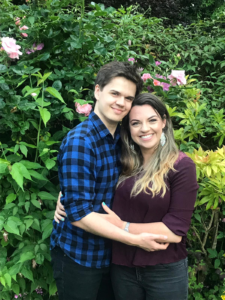The love of my life battles ME/CFS. It’s a disease that my father has also struggled with since I was a boy, so it’s one I know well. I knew life wasn’t going to be simple when we met, but I dove in head-first anyway.
I can’t say it’s been easy, but I can definitely say it’s been worth it. Now, as she completes an enormous milestone – graduating from veterinary school – I couldn’t be prouder. It’s an achievement that she says we all share, something that would have been impossible without the support and assistance that her loving parents and I have given her over the years.
It took a long time for me to grasp that just because my partner wasn’t asking for help, didn’t mean she didn’t need it. After all, it’s important to do what you can to understand ME/CFS. Reading papers and research is good but speaking openly with your loved one is better. Have them explain their struggles – at a rate comfortable to them – so that you can better understand their wants and needs.
My hope is that by sharing some tips learned from our experience with the world, others can help their loved ones in the fight against ME/CFS, too. MEAction already has some excellent resources on this topic, including their Caregiver’s Guide and a Facebook support group, which I implore you to look into.

Everyone experiences ME/CFS differently, which is why understanding your loved one’s personal situation is vital. They often feel like their independence has been stripped from them, and a well-meaning desire to help them can quickly turn into smothering if you try to do everything for them.
Equally, it’s all too easy to lean too far in the other direction and neglect them, too, by simply assuming they don’t need help with something you see as trivial. It takes time to find the sweet spot between the extremes, and this will likely change over time, too. Above all, though, avoid comparing their experience to others – that can leave them feeling guilty, alienated, or both.
And I know none of this is easy. It isn’t easy for them, for us, or for anyone affected by this cruel disease. They’re upset, angry, confused, and we’re feeling all those emotions on their behalf, too, but be mindful; your loved one feels real guilt for needing so much assistance.
So, while open and honest discussion is important, we can alleviate some of that guilt by providing aid without needing to be asked. Whether it’s accompanying them to doctor appointments, helping them keep track of their symptoms and treatments, organizing their medication and supplements, arranging enjoyable activities, or just bringing them their favourite foods, the little things go a long way.
It’s a balancing act, though. When her degree was particularly challenging, I did what I could to massage my partner’s legs every night to ease her pain and help her sleep. Now that she’s finished her course and my own health has taken a hit, I’ve needed to scale that back. Taking care of yourself is important, too.
There will be plenty of bumps along the way, though. Sometimes our role is little more than a coast for the maelstrom to crash against. Other times, we need to be the tree that provides shade and a sturdy foundation to prop them up. But one thing is eternal; we are there for them.
Through thick and thin, showing up is the most important thing. They may not even have the strength or capacity to thank us, but know your aid is appreciated. I can’t tell you the fight will be fair, I can’t even say it will be quick or clean but being their unwavering support will be more help than you will ever know.
I’m reminded of the age-old definition of love, and whether religion plays a role in your life or not, you can take comfort in these words: “Love is patient, love is kind…it is not easily angered, it keeps no record of wrongs…It always protects, always trusts, always hopes, always perseveres. Love never fails…”
So stand by your partner, your parent, your child, friend, or relative. Whoever you know that battles ME/CFS might need you more than they can let on, but they’re damn grateful, far beyond what they can verbalize. It’s a horrible illness, let’s fight it together.




